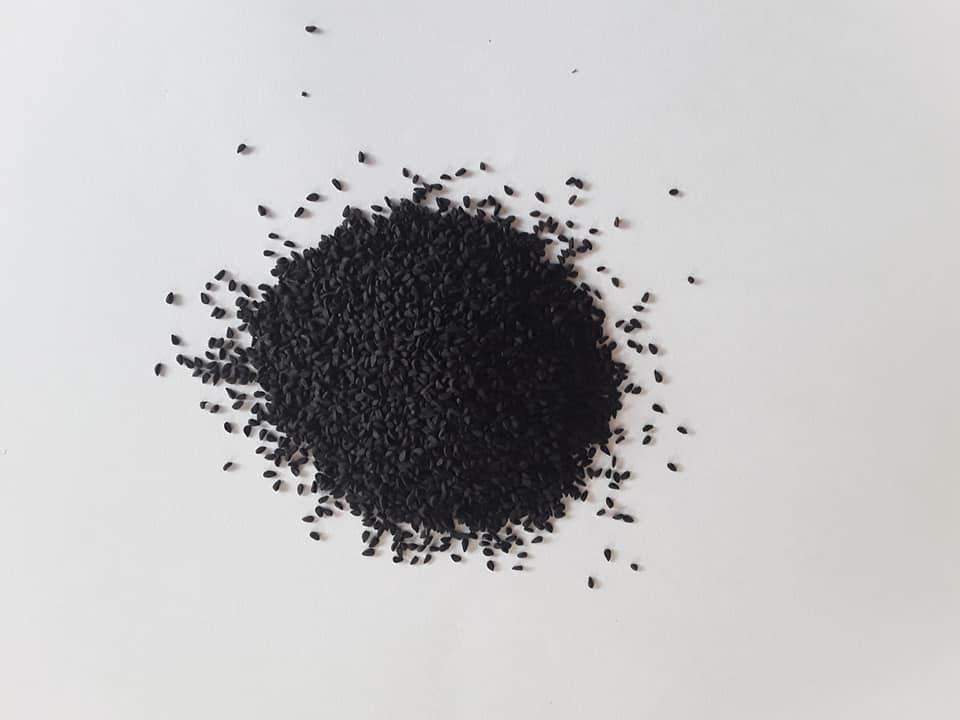
Nigella Seeds Nigella sativa. Plant Family: Ranunculaceae. Other Names: Black Seed, Black Onion Seed, Black Cumin Seed. Also known as kalonji, it belongs to the buttercup family of flowering plants. Nigella seed comes from an annual flowering herb, native to south and southwest Asia and is now found growing throughout the Mediterranean. It grows to a height of 20–30 cm and has upright, branching stems. The herb has two kinds of leaves; the lower leaves are small and petiole, whilst the upper leaves are linear, finely divided, bright green in colour and approximately 6-10cm in length. The 5 petaled flowers grow terminally on each branch of the stem, and are white in colour. The seed head is a capsule, comprised of 5 ‘compartments’ each compartment contains numerous white seeds approximately 3mm in length, that ripen to black when exposed to the air, the seeds are 3 sided with ridged edges.
Nigella seeds can be added to curries, soups and casseroles, they have a nutty, mildly peppery taste with a slightly cumin like edge, dry roasting the seeds prior to cooking with them enhances the flavour of the seed. Nigella is a key ingredient in the Bengali spice blend known as panch phora or panch puran. Sprinkle the seeds over dahl, bread, savoury muffins and flatbreads, stir into rice and grain dishes, pickles, chutneys and scrambled eggs and omelettes.
Can be used in a diuretic tea blend. It has diuretic, antihypertensive, antidiabetic, anticancer and immunomodulatory, analgesic, antimicrobial, anthelmintics, analgesics and anti-inflammatory, spasmolytic, bronchodilator, gastroprotective, hepatoprotective, renal protective and antioxidant properties. The seeds of N. sativa are widely used in the treatment of various diseases like
- bronchitis
- asthma
- diarrhea
- rheumatism
- and skin disorders.
It is also used as
- liver tonic
- digestive
- anti-diarrheal
- appetite stimulant
- emmenagogue
- to increase milk production in nursing mothers
- to fight parasitic infections
- and to support immune system.
Most of the therapeutic properties of this plant are due to the presence of thymoquinone (TQ) which is a major active chemical component of the essential oil.
N. sativa has been traditionally used for the treatment of a variety of disorders, diseases and conditions pertaining to respiratory system, digestive tract, kidney and liver function, cardio vascular system and immune system support, as well as for general well-being. Black seeds and their oil have a long history of folklore usage in Indian and Arabian civilization as food and medicine. The seeds have been traditionally used in Southeast Asian and the Middle East countries for the treatment of several diseases and ailments including asthma, bronchitis, rheumatism and related inflammatory diseases. Its many uses have earned Nigella the Arabic approbation ‘Habbatul barakah’, meaning the seed of blessing.
Effects: Antibacterial; Anti-fungal; Anti-schistosomiasis; Antioxidant; Anti-diabetic; Anticancer; Anti-inflammatory and analgesic; Immuno-modulatory; Cardiovascular; Gastro-protective; Hepato-protective; Nephro-protective; Pulmonary-protective & anti-asthmatic; Testicular-protective; Neuro-pharmacolgical; Anticonvulsant; and more.
Applying kalonji may cause contact dermatitis in some people. Test-tube and animal studies have shown that it may also influence blood clotting and possibly slow down uterine contractions during pregnancy. May interfere with some prescribed drugs, so book an appointment with your GP before use, especially if pregnant or breastfeeding. Thoroughly research any new herb you are considering using.
With a bitter taste that is described as a mix between oregano and onions, it is often found in Middle Eastern and South Asian cuisines. It’s usually lightly toasted and then ground or used whole to add flavor to bread or curry dishes. Some people also eat the seeds raw or mix them with honey or water. They can also be added to oatmeal, smoothies or yogurt.
To make a tea, crush a tablespoon of nigella in a mortar and pestle; doesn’t have to be too fine, you just want to release the essential oils. Place them in an infuser, Pour a cup of almost boiling water over and allow to steep 8 to 10 minutes. Strain, Flavor with milk (cow or soya), cream, honey or vanilla as desired. Add a couple of cloves or a star anise if liked. Another alternative addition is A few pieces of cinnamon to taste and a cardamom pod.
